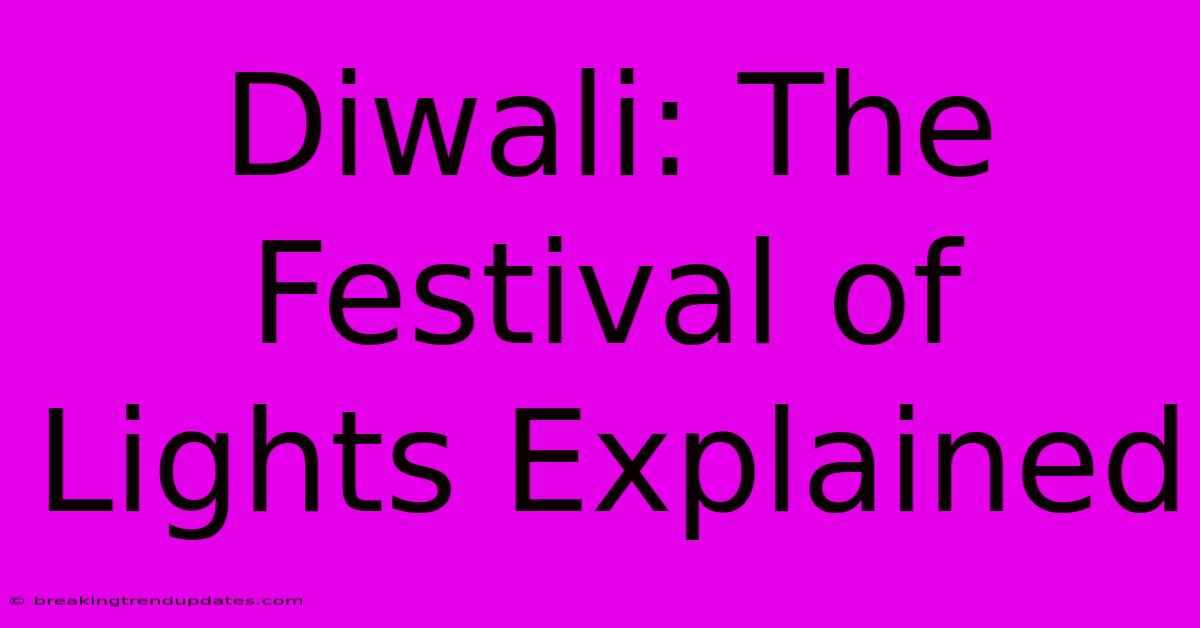Diwali: The Festival Of Lights Explained

Discover more detailed and exciting information on our website. Click the link below to start your adventure: Visit Best Website breakingtrendupdates.com. Don't miss out!
Table of Contents
Diwali: The Festival of Lights Explained
Diwali, also known as the Festival of Lights, is one of the most significant and joyous festivals celebrated by Hindus, Sikhs, and Jains around the world. This vibrant festival is a time for celebration, joy, and the triumph of good over evil.
The Story Behind Diwali
Diwali marks the return of Lord Rama, the seventh avatar of Vishnu, to Ayodhya after 14 years of exile. During his exile, Rama, along with his wife Sita and brother Lakshmana, fought against the demon king Ravana and ultimately defeated him. Upon their return, the people of Ayodhya lit diyas (oil lamps) to welcome their beloved king home, illuminating their city in a dazzling display of lights.
Diwali also celebrates other significant events:
- The birth of Lakshmi, the goddess of wealth and prosperity.
- The victory of Lord Krishna over the demon king Narakasura.
- The coronation of Lord Vikramaditya, a legendary king known for his justice and wisdom.
The Significance of Diwali
Beyond its historical significance, Diwali holds deep spiritual meaning:
- Triumph of Light Over Darkness: The festival symbolizes the victory of good over evil, knowledge over ignorance, and hope over despair. The lighting of diyas and candles signifies the triumph of light over darkness, guiding us towards a path of righteousness.
- Celebrating New Beginnings: Diwali marks the end of the harvest season and the beginning of a new year. It is a time for new beginnings, reflecting on the past, and setting intentions for the future.
- Seeking Blessings: During Diwali, people seek blessings from Lakshmi and Ganesha, the remover of obstacles, for wealth, prosperity, and happiness.
How Diwali is Celebrated
Diwali celebrations last for five days, each day holding specific significance:
- Dhanteras: On this day, people worship Lakshmi and Dhanvantari, the god of health and medicine. They also buy new things like utensils and jewelry to invite prosperity.
- Naraka Chaturdashi: This day commemorates Krishna's victory over Narakasura. People wake up early, take a bath, and wear new clothes.
- Diwali: The main day of Diwali, where homes and temples are decorated with diyas, candles, and rangoli (colorful floor designs). Families gather for feasts, light fireworks, and exchange gifts.
- Annakut: On this day, people offer a variety of food offerings to Krishna as a sign of gratitude for the harvest.
- Bhai Dooj: This day celebrates the bond between brothers and sisters. Sisters apply tilak to their brothers' foreheads and pray for their well-being.
Diwali Traditions
- Diyas: Lighting diyas, small oil lamps made of clay, is an essential part of Diwali. They symbolize the victory of light over darkness and are placed inside and outside homes.
- Fireworks: Fireworks are a popular way to celebrate Diwali. The sounds and lights of fireworks add to the festive atmosphere.
- Rangoli: Creating intricate designs on the floor using colored powders, flower petals, or rice is a popular tradition. Rangoli symbolizes the beauty and welcoming nature of the festival.
- Sweets and Snacks: Diwali is a time for feasting and enjoying sweets like laddoos, barfi, and gulab jamun.
- New Clothes: It is customary to wear new clothes on Diwali, representing a fresh start and a commitment to prosperity.
Diwali Around the World
Diwali is celebrated with enthusiasm in India and by the Indian diaspora around the world. The festival brings communities together, fostering a sense of unity and joy.
Whether you are a Hindu, Sikh, Jain, or simply someone who appreciates the spirit of celebration and the beauty of lights, Diwali is a festival that welcomes everyone.

Thank you for visiting our website wich cover about Diwali: The Festival Of Lights Explained. We hope the information provided has been useful to you. Feel free to contact us if you have any questions or need further assistance. See you next time and dont miss to bookmark.
Thank you for visiting our website wich cover about Diwali: The Festival Of Lights Explained. We hope the information provided has been useful to you. Feel free to contact us if you have any questions or need further assistance. See you next time and dont miss to bookmark.
Featured Posts
-
Diwali History Significance And Customs
Nov 01, 2024
-
Yankees Offseason Re Signing Soto Key
Nov 01, 2024
-
Basquet Local Definidos Los Semifinalistas Del Clausura
Nov 01, 2024
-
Court Rules Pauline Hanson Racially Discriminatory
Nov 01, 2024
-
Roma X Torino Transmissao Ao Vivo Escalacoes E Mais
Nov 01, 2024
